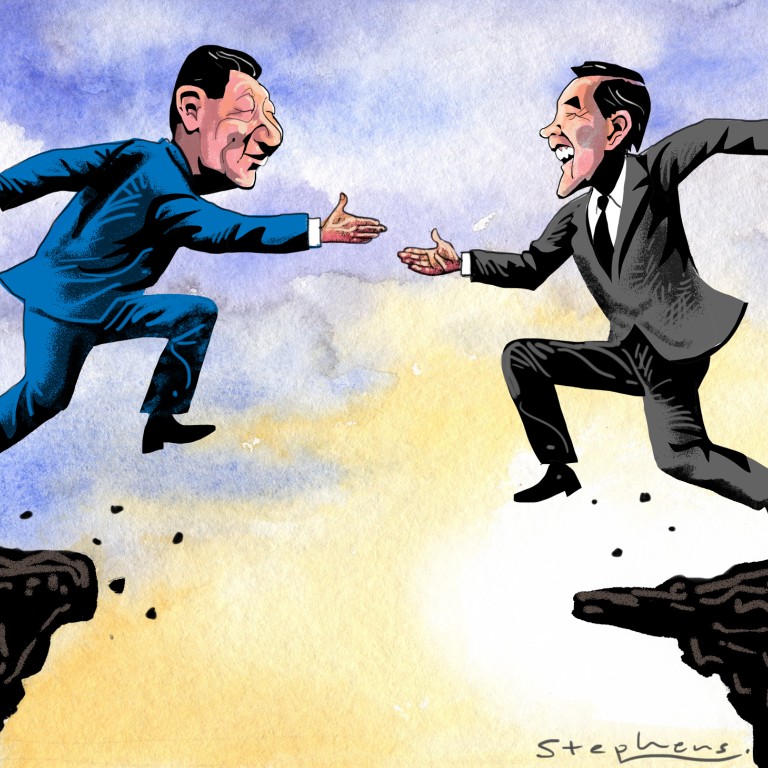
Meeting face to face, Xi Jinping and Ma Ying-jeou take a big leap of faith towards peace
Lawrence J. Lau believes the meeting of Xi Jinping and Ma Ying-jeou, as equals, lays the foundation for lasting peace for their peoples
The historic summit meeting between President Xi Jinping (習近平) and President Ma Ying-jeou in Singapore last Saturday was the very first time the leaders of the two sides of the Taiwan Strait have met face to face since the meeting between Chiang Kai-shek and Mao Zedong (毛澤東) in Chongqing (重慶) in 1945. This is indeed a milestone – the culmination of the progress in the development of “formal” relations between the two sides since the similarly historic “ice-breaking journey” undertaken by Dr Lien Chan, then chairman of the Kuomintang, in 2005, to meet then president Hu Jintao (胡錦濤) in his capacity as general secretary of the Chinese Communist Party. That ushered in a period of party-to-party relations at the highest levels.
READ MORE: Full coverage of the summit between Xi Jinping and Ma Ying-jeou
There were secret but widely known meetings between the confidants of president Jiang Zemin (江澤民) and president Lee Teng-hui in Macau and elsewhere in the early 1990s, but nothing seemed to have come of it. The Hu-Lien meeting, in turn, harked back to another historic meeting – that between the late Koo Chen-fu and Wang Daohan, as the heads of, respectively, the Straits Exchange Foundation and the Association for Relations Across the Taiwan Strait, the “non-governmental” organisations responsible for cross-strait relations, in 1993, and also in Singapore.

Because of this meeting, Ma’s position in history is assured
Ma has clearly contributed greatly to the improvement of cross-strait relations during his administration. Between 2008 and 2014, Taiwanese exports to the mainland grew from US$103 billion to US$152 billion, while exports from the mainland to Taiwan also grew, from US$26 billion to US$46 billion, with Taiwan running a trade surplus of over US$100 billion a year. During the same period, mainland visitors to Taiwan jumped from 280,000 to about 4 million while Taiwanese visitors to the mainland increased from 4.36 million to 5.37 million.

But more than anything else, over the past eight years, both sides have quietly engaged in building mutual confidence and developing mutual trust. For example, on the diplomatic recognition front, there was basically a standstill, with both sides refraining from trying to persuade another country to switch recognition from one side to the other. This has resulted in significantly reduced tensions and potential conflicts between the two sides.
READ MORE: Did Ma Ying-jeou stand up for Taiwan in closed-door summit with Xi Jinping?
It is no secret that Ma wanted a meeting with Xi, but only under conditions of equality, dignity and mutual respect, even though the mainland is much larger and more powerful than Taiwan. It took a most far-sighted President Xi to take a bold, decisive and magnanimous step to meet President Ma one-on-one, as equals (even though they only addressed each other as “mister”). This represents a major concession to Taiwan – that a national leader would treat the leader of a “breakaway” region as an equal. There was certainly opposition to this summit meeting on both sides, inside and outside the respective governments. But they did manage to meet, as partners in an enterprise to ensure a peaceful journey as well as a peaceful end. I believe leaders of both sides of the strait feel that they have the responsibility to their own people to make sure that whatever happens, happens peacefully.

Even though the meeting was arranged for the mutual benefit of the mainland and Taiwan, it should be welcomed by the rest of the world, as any development that increases the potential for peace and reduces the potential for war is good for the world at large. The US has expressed its support for this meeting.
It is not clear that this meeting will necessarily benefit the Kuomintang in the upcoming presidential election in Taiwan. But by creating a precedent, it does pave the way for direct contact and face-to-face meetings between the leaders on both sides of the strait in the future.
READ MORE: Taiwanese opposition leader Tsai Ing-wen extends lead in post-Xi-Ma summit opinion poll

Some may also ask: why Singapore? I believe Singapore is a neutral place, and its government has friendly relations with both sides and was ready to facilitate the meeting, as it did with the Koo-Wang meeting back in 1993. Holding this first meeting in Singapore would not preclude such subsequent meetings be held on the mainland, Taiwan, Hong Kong or Macau. It is also a signal to Southeast Asian countries that China is ready to sit down and talk to them one-on-one, on the basis of equality and mutual respect.
Ultimately, there will have to be a settlement between the two sides of the Taiwan Strait, hopefully one negotiated between the leaders of both sides. In this sense, direct contact between them is not only inevitable, but also absolutely necessary. The summit is just a first meeting between the leaders of the two sides since 1945, but it will not be the last. With this precedent, it will be much easier for a president from Taiwan, of whatever party, to meet the president of China in future.
Lawrence J. Lau is the Ralph and Claire Landau Professor of Economics at the Chinese University of Hong Kong, and Kwoh-Ting Li Professor in Economic Development, emeritus, at Stanford University. All opinions expressed herein are the author’s own and do not necessarily reflect the views of any of the organisations with which the author is affiliated

